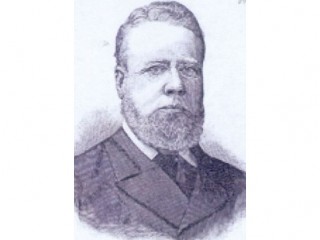
Frederick Kirk Fairthorne biography
Date of birth : 1846-12-09
Date of death : 1919-11-14
Birthplace : Longford, Van Diemen's Land (Tasmania), Australia
Nationality : English
Category : Famous Figures
Last modified : 2011-03-25
Credited as : Colonial militia, pharmacist and entrepreneur,, local government head
0 votes so far
Born on 13 February 1823 in London, Fairthorne senior arrived in South Australia in 1839 and moved in 1842 to Tasmania, where he qualified to practise as a chemist by examination in 1844. Landon then opened in business at Longford before setting up as a chemist and druggist at Launceston. Intercolonial shipping and gold- and tin-mining ventures were other interests, and he was mayor of Launceston in 1884-85. Landon died on 17 August 1890.
His success had given his son a good start in colonial life.
Frederick was educated at Horton College, Ross, and at Launceston Church Grammar School in 1861. After a few years on the mainland in shipping and wheat-broking, he was articled to his father, qualified as a chemist in 1871 and was soon taken into partnership. L. Fairthorne & Son expanded into a large wholesale as well as retail and dispensing pharmacy. Frederick was a founding member and sometime president of the Pharmaceutical Society of Tasmania.On 27 July 1884 at St John's Church, Launceston, he married Louisa Letitia Hardman. They were to have three sons and two daughters. Appointed a justice of the peace in 1893, in December 1897 Fairthorne was elected an alderman of the city of Launceston and was mayor in 1900-02. He resigned from the council in 1908. Closely identified with the Tasmanian Defence Force, for some years he was adjutant of the Launceston Rifle Regiment, holding the rank of captain on his retirement.
He shared his father's interest in mining. In 1890 Frederick was appointed director of the Mount Bischoff Tin Mining Co. and was subsequently chairman. He was also chairman of the Royal George Co. and personally owned and worked several small mining ventures with more or less success. His interests extended to both the north-east and to the west coast of Tasmania, where silver, lead and zinc were being mined very profitably in the late nineteenth century.Fairthorne was involved in several good causes at Launceston. He was governor and honorary treasurer of the Girls' Industrial School and director of Launceston Savings Bank.
He was also on the local directorate of the New Zealand Insurance Co. Respected by his colleagues and the citizens of Launceston, he was often encouraged to stand for parliament, but declined to take an active role in party politics.
The Reform League, however, which argued for level State expenditure and taxation in post-Federation Tasmania, won his firm support. After a long illness, Fairthorne died at his home at Launceston on 14 November 1919 and was buried in Carr Villa cemetery. He was survived by his wife and two daughters, and by two sons who carried on the business. Fairthorne Road, at Trevallyn, Launceston, was probably named after the younger son Frederick Falkener Fairthorne (1887-1963), athlete and pharmacist, who served in the Australian Imperial Force in World War I. The firm had become Drug Houses of Australia Ltd (Tasmania) some years before his death.
















